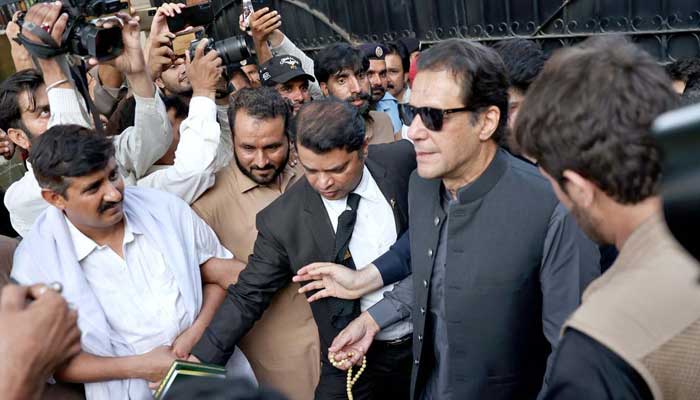
Former Prime Minister Imran Khan’s Tehreek-e-Insaf (PTI) party and its affiliates have won the most seats in Pakistan’s elections, the election commission has revealed as it declared final results in the hotly-contested vote.
A number of independent candidates allied to the jailed former leader’s PTI have won National Assembly seats in the February 8 vote, the commission said, helping the party to a surprise lead with 97 of the 265 seats. However, with no party winning a majority, and numerous contenders claiming vote tampering, Pakistan’s political future is very uncertain.
Five other independents not backed by Imran Khan also secured seats. The PTI was trailed by the Pakistan Muslim League (PMLN), led by Khan’s fierce rival, former Prime Minister Nawaz Sharif, with 76 seats. The 54 seats won by the Pakistan People’s Party (PPP) offer it the potential to be kingmaker.
However, several other smaller parties also took seats, meaning complex negotiations over forming a government are likely to follow.
The Muttahida Qaumi Movement (MQM), a Karachi-based party, made a surprising return in the polls to win 17 seats, with several others grabbing a combined 20 seats.
The vote, which was marred by deadly violence, was held to select 265 National Assembly members, meaning 134 seats are required for a coalition to gain a simple majority.
Several results have been put on hold by the election commission following stay orders issued by courts.
Thousands of angry protesters had poured into the streets of multiple cities during the delay in vote counting over recent days – blamed on a telecommunications cut-off on the day of the vote for what the authorities called security reasons – with several people killed.
The release of the final results, and stay orders, have sparked new demonstrations across the country. However, in the meantime, violence has been limited.
Pakistan’s powerful military, which has directly ruled for nearly three decades in Pakistan’s 76-year history, has called for stability and calm. Close to PMLN, it is thought to stand ready to step in should the various parties fail to agree a governing coalition.
The PTI, among several other parties, has called for protests against the results, alleging they have been rigged.
Reporting from Islamabad, Al Jazeera’s Kamal Hyder said that three of the stay orders are on seats that the PTI claims its independent candidates had won by a huge margin.
“If this is not settled through the legal way, these protests could spread across the country and perhaps even evolve into a movement,” he said. “Amid such orders, it appears that there will be a delay in the formation of the next government.”
One PTI supporter from Lahore told Al Jazeera that he would not sit silently and allow his party’s mandate to be stolen.
“The fact that internet was blocked on day of election showed how the state tried to tamper with the results. We believe that state institutions are fully involved in this and this is deplorable. They should respect the votes by the people,” he said, adding that he was headed to protest in the afternoon.
At least six independent candidates backed by the PTI party have appealed against the results in court.
Analyst Zaigham Khan told Al Jazeera there are two main possible scenarios after election results are announced.
“The most likely scenario is a coalition government that includes all political parties – minus Khan’s PTI,” he told Al Jazeera. This will include the two largest political parties, PPP and PMLN, as well as MQM, Jamaat-e-Islami and others.
“The second scenario, less likely but technically possible, is the PPP joining hands with the PTI and forming a government,” the analyst said.
Speaking to Al Jazeera’s Inside Story, Farzana Sheikh, a specialist on Pakistani politics and economy, said the election results were “astonishing”.
Millions turned out to defy what was widely reported as the military establishment’s desired outcome – a clear win for its preferred candidate, Nawaz Sharif, she said.
“It also points to the deep frustration of a population that really is desperate for change, desperate for a new government to address, in particular, the acute economic crisis that currently faces the country.” (Al-Jazeera)
